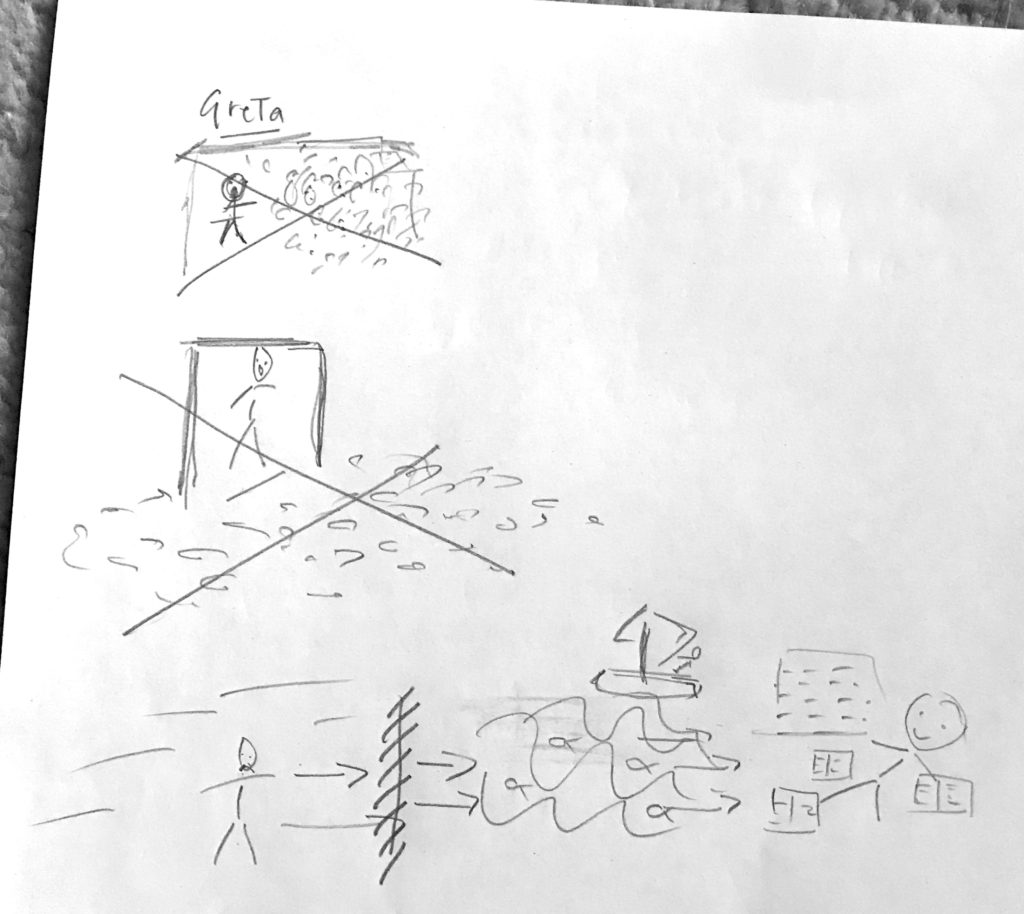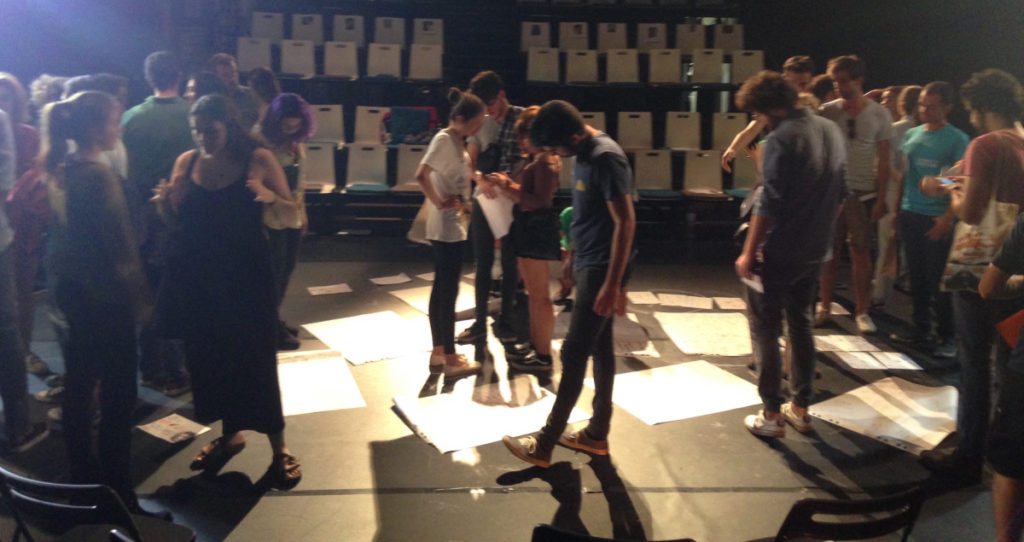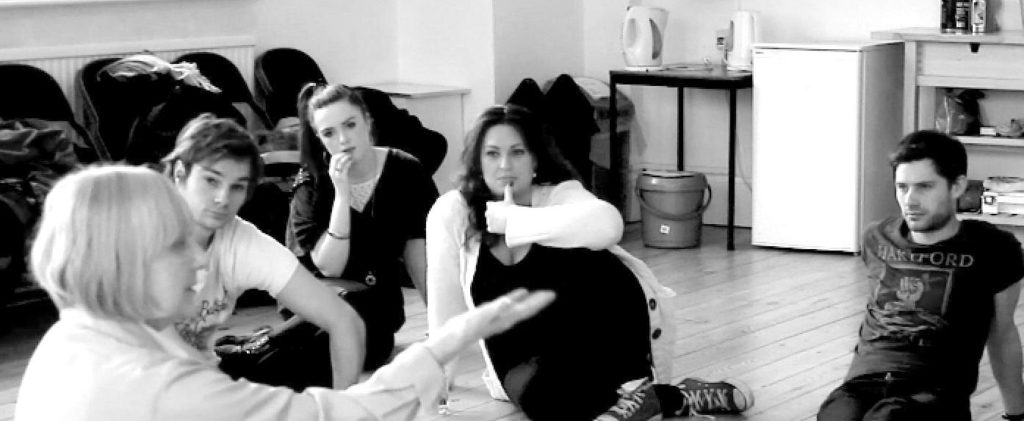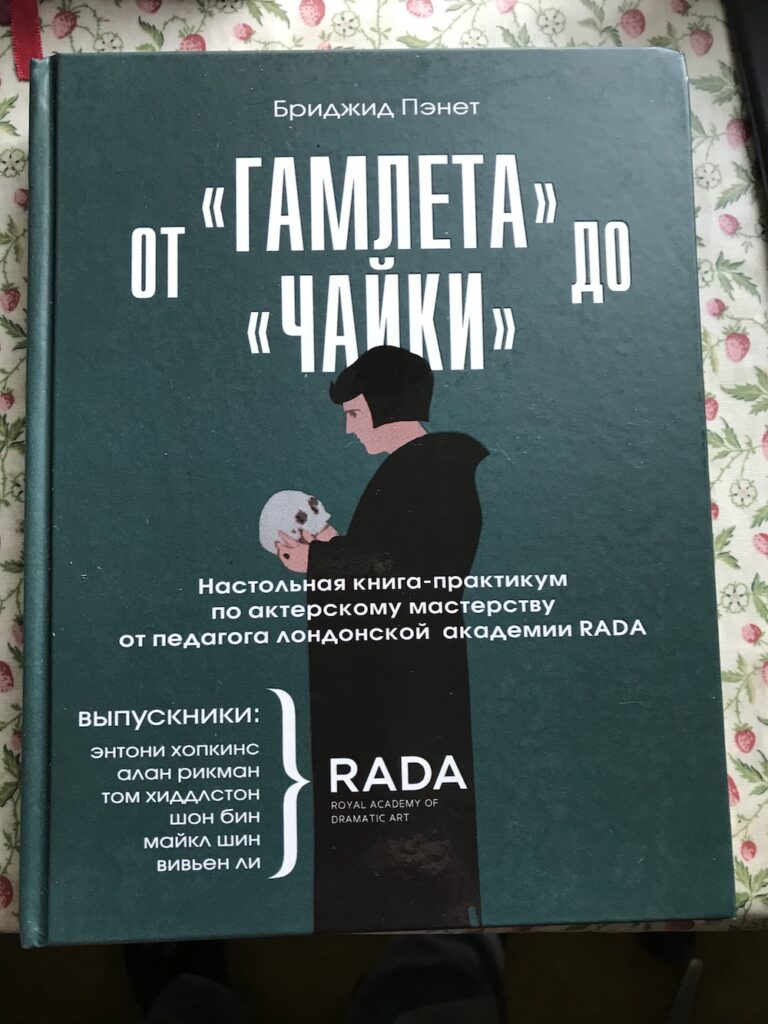Many thanks to Olga Blagodatskikh for translating the work. You can find the book for sale in physical form here, in audiobook here, and as an ebook here. … [Read More...] about My book is now in Russian!
Main Content
Freedom in acting: Seven words to change
In this brief list I endeavour to clear away the words which can lead to stress and muddle in the actor, replacing them with practical words of reliable do-able action. The greatest weapon against stress is our ability to change one thought for another-William James The seven words are for you to consider in whatever order you choose. What happens if you change the word? Change the … [Read More...] about Freedom in acting: Seven words to change
Working with images and abstract concepts
https://youtu.be/Hn3Cx4HrpW0 Images exist in plays in order to make abstract concepts more concrete. Shakespeare does this for us frequently. He uses concrete images of real things to describe otherwise abstract ideas. When preparing a scene with lines that contain images, be sure that first, you understand the image. What does it represent? What does it mean? And second, create a clear … [Read More...] about Working with images and abstract concepts
The Telegram Exercise
https://www.youtube.com/watch?v=zlF7ekJSmyA In this video, I describe my method for uncovering and utilizing the core message in a speech or scene: the telegram exercise. This is one way to help move the story forward in a way that the audience will understand. The exercise is based on Stanislavski's concept of the single stress - emphasizing the most important word in a sentence. This … [Read More...] about The Telegram Exercise

How to learn lines by heart
In these workshops we will be looking at how we learn lines; developing essential skills and a wider range of expression. Why learn lines by heart With so much work for the camera at the moment and probably in the future, the temptation for the actor is to rely on reading the script while pretending not to. This means that we start with a lie and a barrier between us!There is a big … [Read More...] about How to learn lines by heart
Laban Part 1: Exploring Space
Exploring Laban Space Let's look at the idea of space in aspects of human behaviour, using the Laban vocabulary of physical action. The four elements Space Time Force Flow When we focus on any one of the 4 elements we are always aware that each element is inextricably connected to the other three. Just as, if we were analysing the human body and focussing on the heart, we would never … [Read More...] about Laban Part 1: Exploring Space
The Five-Act Structure in Shakespeare
A game between the forces of Good and Evil: Light and Darkness. In Shakespeare's comedies: The side we hope will win, the Light, versus the side of Darkness... Sympathy, empathy vs. Antipathy, Hatred Truth vs. Lies, Seeming Harmony vs. Discord In Shakespeare's tragedies and regeneration plays: Love vs. Hate Life vs. Death Heaven vs. Hell Order vs. Chaos Winning the game In … [Read More...] about The Five-Act Structure in Shakespeare
Adjectives in Their Order
Did you know that there is a correct/ habitual order of adjectives in English? I have just found out this rule which we all conform to without knowing. We order our adjectives based on what they describe. The Order of Adjectives The proper order by type of adjective is, from top to bottom, Opinion Size Age Shape Colour Origin Material Purpose The only time we notice … [Read More...] about Adjectives in Their Order
Shakespeare: Examples of Work on Various Scenes
HENRY IV pt 1 V iii. Original text SUFFOLK: Fond man, remember that thou hast a wife; how then can Margaret be thy paramour? MARGARET: ‘twere best to leave him for he will not hear. SUFFOLK: There all is marr’d; there lies a cooling card. MARGAERT: he talks at random; sure the man is mad. Text as prose SUFFOLK: (talking to himself and to the audience) Mad and besotted man, remember … [Read More...] about Shakespeare: Examples of Work on Various Scenes
Laban’s Vocabulary of Rhythm: An Overview for Actors
In this video, we'll discuss an overview of Laban's Vocabulary of Rhythm. Stanislavsky says that an actor cannot function without an understanding of rhythm. In his final and most effective approach to the craft of acting, the Method of Physical Action, he searched for a practical system of rhythmic action that joined, as one direct experience, the inner emotions and outer activity of the actor … [Read More...] about Laban’s Vocabulary of Rhythm: An Overview for Actors
Shakespeare: A Look at Sonnet 23
In this article, I'll analyze Shakespeare's Sonnet 23 for performance. I'll break down each step of the process down the line. Dividing the Sonnet I will start with dividing the sonnet into sentences, to look at the flow of sense and the breathing needed. I find, however, that if I keep to the punctuation of the Arden edition, the first full stop (period) comes in line 13 with the ‘!’. The other … [Read More...] about Shakespeare: A Look at Sonnet 23
The Map of the Speech or Scene
The Maps This video follows the work on from the previous technique of ‘Maps.’ First, the Map of Me, then the Map of the Character, and next, the Map of the Speech or Scene. These give: The experience of a strong personal connection between the person writing the Map of their lives and the images on the page. The Map of Me. The parallel strong personal connection between the actor drawing … [Read More...] about The Map of the Speech or Scene
Cuckolds, Bastards, and the Position of Women in Shakespeare
In this article, we'll be discussing a number of topics and their implications in Shakespeare's time. Specifically, we'll focus on cuckolds, bastards, and women, and their positions in society. Cuckolds A cuckold is a deceived husband, usually one who doesn’t yet know of his wife’s infidelity. The word comes from ‘cuckoo,’ the bird who takes over the nest of a bird of a different sort, kicks out … [Read More...] about Cuckolds, Bastards, and the Position of Women in Shakespeare
Shakespeare’s Words: Some That Need Clarification
Shakespeare's Words Some of Shakespeare’s common words have changed their meaning a bit over the 400+ years and some had more power then than they may have now. Here is the start of a list of words with new or different meanings in today's world. More suggestions are welcome! Words with changed meanings AN If, (not 'and'); also: an if. BRAVE, bravely Its modern meaning but also … [Read More...] about Shakespeare’s Words: Some That Need Clarification
Thou and You in Shakespeare
Shakespeare: Thou and You Many wonder about the differences between thou and you. Specifically how to use them and what they mean. This article define the words and their usage in an attempt to provide some clarity. Original usage In Old English, the rules for second-person pronouns were the same as for most Romance languages: Thou / thee / thy / thine for talking to one person … [Read More...] about Thou and You in Shakespeare
Map of the Character
Map of the Character Following on from the Map of Me, we move into the imagined life of the imagined character. Here the actor will be living in the Truth of Imagination for a brief period of time, while her constant Truth of Daily Life continues in an unbroken line of common sense and physical awareness, at a lower level of consciousness. Preparing the Map We start with essential … [Read More...] about Map of the Character
The Map of Me
The Map of Me The Map of Me is a quick and enjoyable drawing exercise; you can’t get it wrong. It is easy, simple and totally personal to you. No-one else could make it or fully understand it. This exercise can be private work, whether you draw when alone or in a group, and it can also be shared with others if you wish. (I find that people really enjoy explaining their map to a friend in the … [Read More...] about The Map of Me
Elizabethan Beliefs: Stars, Humours, etc.
When working on the plays of Shakespeare and his fellow playwrights it is important to understand Elizabethan beliefs and cultural assumptions. Communities of the time, and for many years afterwards, took these basic assumptions for granted. of his time and for many years afterwards. The Stars We are all under the influence of the stars: they were in perfect order and benevolent to man before … [Read More...] about Elizabethan Beliefs: Stars, Humours, etc.
Line Learning with Confidence
Actors must learn and remember their lines! Many find the process of line learning scary and unpleasant. They try to force the little black marks on the page into their minds, sometimes until the words lose all meaning. Then comes the nagging fear of forgetting: having a sudden blankness in the middle of a scene or audition. Since 2013 I have been teaching workshops called ‘Line Learning with … [Read More...] about Line Learning with Confidence
Some Basics for Actors: Words and How We Use Them
‘In the beginning was the word……’ Actors work with, through and because of the power of words, so it’s useful to understand how words fit together in English to convey our intentions and meaning. We can also join the grammar to a clear acting process. We can start with NOUNS. A noun is the name of a thing. Concrete nouns name things which are perceived through the 5 senses: script; theatre; … [Read More...] about Some Basics for Actors: Words and How We Use Them
What is Acting and How Do You Do It?
What is Acting and How Do You Do It? This is no. 3 a series of ‘letters’ that I am writing for people interested in the craft and uses of acting as a creative journey, as fun, personal expression, understanding of self and others and as a marketable, socially necessary, skill. I have written about this in my book ‘Essential Acting’ (pub. Routledge) and expanded the work in the second edition of … [Read More...] about What is Acting and How Do You Do It?

A Simple Exercise for New Groups
Hello, This is Brigid wishing to share with you an enjoyable, safe and useful starter exercise, for any new group or workshop. The subject or reason why you are together in that room a that time is not important: this exercise is just a friendly way to 'arrive,' to be present, and to realize that we all experience basic Fears and Joys when with a new group of people, exploring a new area of … [Read More...] about A Simple Exercise for New Groups

Hello from Brigid
Hello, my name is Brigid Panet. I am a freelance teacher of acting and a theatre director working mostly at RADA and also at Royal Central School of Speech and Drama, The Actors Centre in London and The Lir in Dublin. Next month, gong to Madrid to work with actors there. I am fascinated by the processes of acting; have written a book of my working methods (Essential Acting, pub. Routledge.). … [Read More...] about Hello from Brigid
